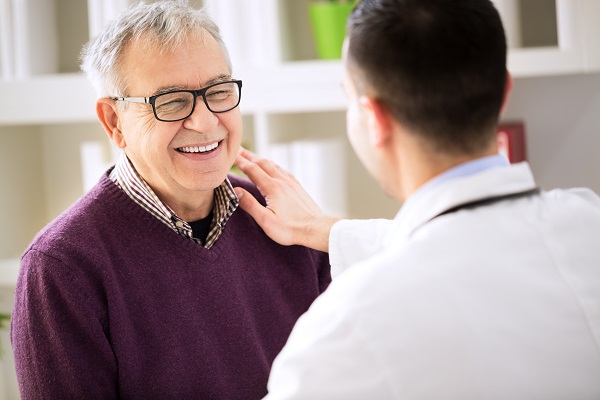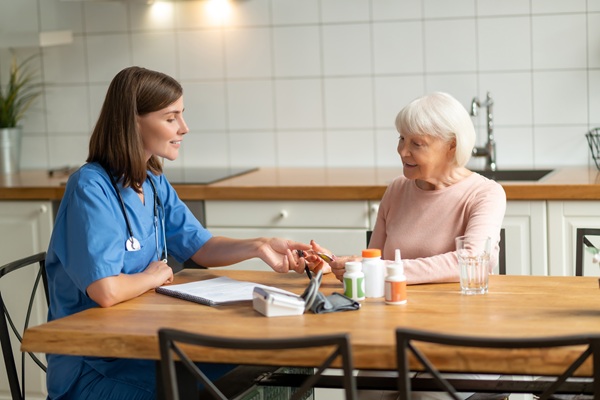What to Expect at Your First Oncology Appointment

The first oncology appointment is a chance for the patient and the oncologist to get to know each other. Understanding what to expect can help patients who are nervous or anxious to feel better before the visit and ensure they are able to come fully prepared.
The oncology consultation process
Each visit is unique and tailored to the patient’s specific needs, but it typically involves meeting with the oncologist and the rest of the oncology team, documenting previous medical history, a physical examination and a discussion about the treatment plan. The following is an overview of each step that is likely involved during the first visit.
Meeting the oncology team
Oftentimes, the first thing that will occur during an oncology appointment is to meet with the oncologist and the rest of the staff. Depending on the stage of the process (diagnosis, treatment, etc.), the oncologist may collect medical information and discuss the symptoms the patient is experiencing. This is also a good opportunity for patients to ask the oncologist questions about concerns they may have or about what lies ahead during the treatment process.
The physical examination
The next step is testing. The oncologist may start by conducting a physical examination to check for tumors and secondary symptoms of cancer. They may also order various blood tests, order imaging tests and schedule a time for a biopsy if necessary. If the patient is there due to symptoms and has not been diagnosed with cancer, then the goal of the visit is to determine if the patient has cancer and what stage of cancer the patient is in if it does exist. This information allows the patient and the oncologist to find the best treatment plan possible.
Determining a treatment plan
Based on the pathology reports, an oncologist will determine the best course of action either on the first visit or soon after. This allows the patient to mentally prepare early in the process and get ahead of the game in fighting the cancer. Oncologists rarely treat patients by themselves, and they may refer the patient to other types of oncologists and health professionals if there are areas where the patient will need additional assistance during the treatment process.
Ask questions and building trust
The initial oncology appointment is also designed to help the patient learn. The oncologist will welcome any and all questions the patient has about cancer, their symptoms, the diagnosis and the treatment plan. Asking questions helps the patient feel more comfortable, and having a back and forth conversation allows the patient to develop a trusting relationship with the oncologist. This trust can help the patient remain confident during treatment.
Schedule an oncology appointment today
To learn more about what to expect at a first oncology appointment, or if there are any other outstanding questions then we encourage individuals to reach out today. A consultation can be done to determine needs, which can dictate how the oncology treatment process goes.
Get more information here: https://lindenbergcancer.com or call Lindenberg Cancer & Hematology Center at (856) 475-0876
Check out what others are saying about our services on Yelp: Oncology in Marlton, NJ.
Recent Posts
An ovarian cancer diagnosis can be scary, as this form of cancer often develops without noticeable symptoms in the early stages. As the disease progresses, it can become more difficult to treat, making early awareness important. Knowing the signs, understanding the diagnostic process, and learning about treatment options from an oncologist can offer patients hope…
Gynecological cancer treatments target cancers that affect the female reproductive organs, such as ovarian, uterine, cervical, vaginal, and vulvar cancers. Fortunately, there have been significant medical advances in cancer treatment that have greatly improved patient outcomes, allowing oncologists to adjust therapies to fit each patient's needs and overall health. These targeted treatments work better than…
Gastrointestinal cancer treatment is a broad and evolving field focusing on cancers affecting the digestive tract, including the esophagus, stomach, pancreas, liver, small intestine, colon, and rectum. Each area may involve different approaches based on the cancer's stage, location, and specific genetic factors. Oncologists often coordinate with surgeons, radiologists, and other specialists to create a…
Finding a hematologist near me is an important step when facing symptoms that may indicate a blood disorder or a more serious underlying condition. While not every unusual symptom warrants a referral, recognizing certain signs early can lead to more effective treatment and improved outcomes. Knowing when a hematologist’s expertise is necessary can help patients…


